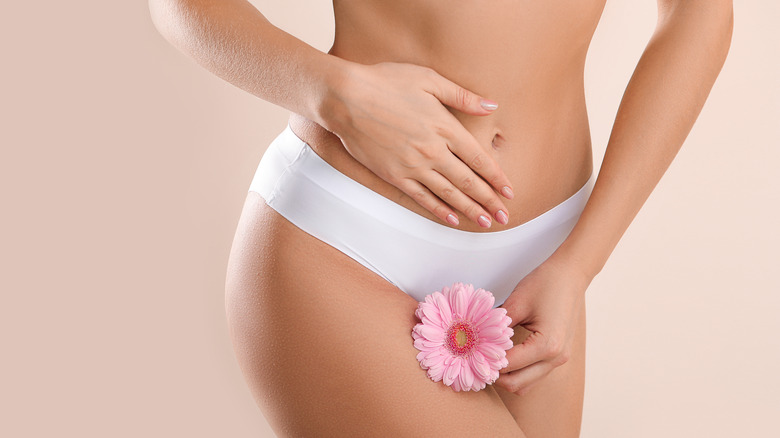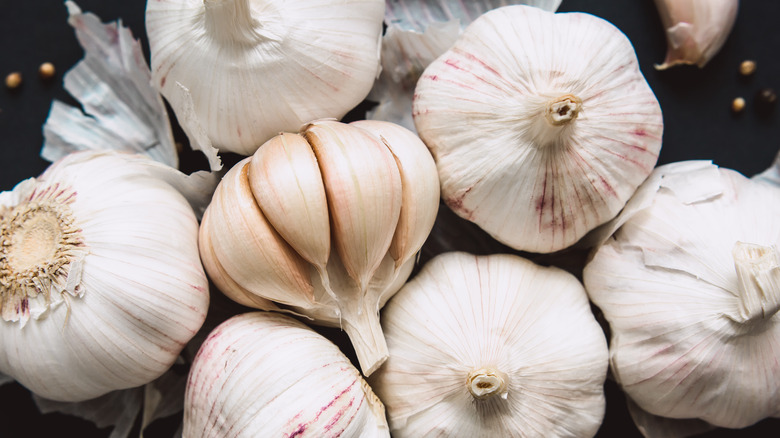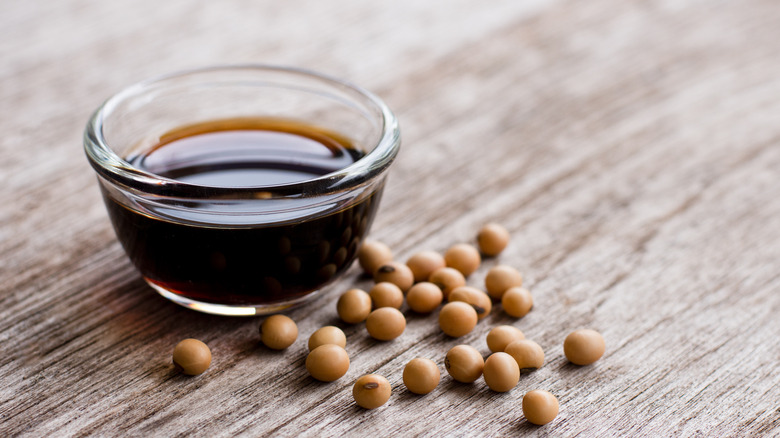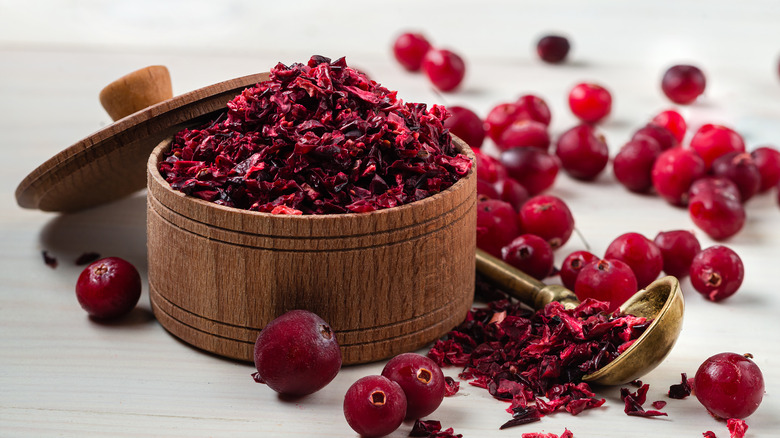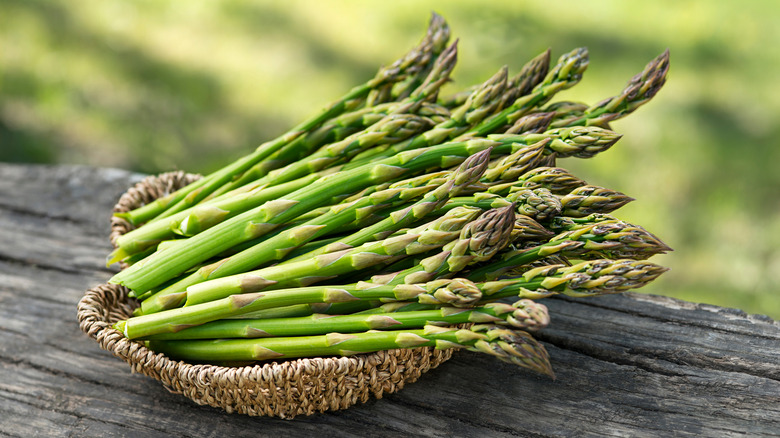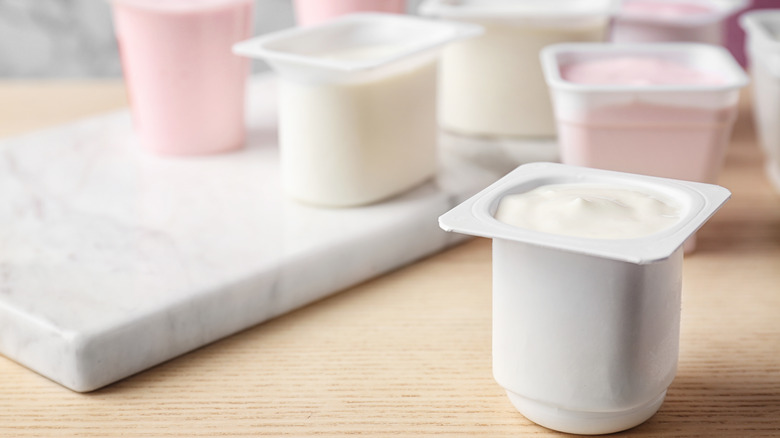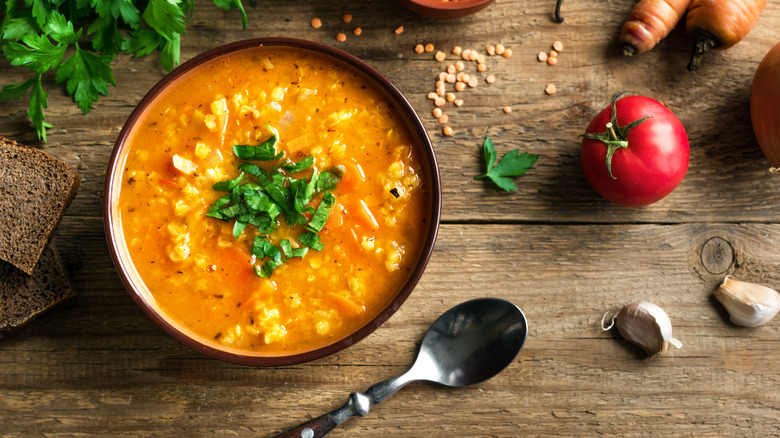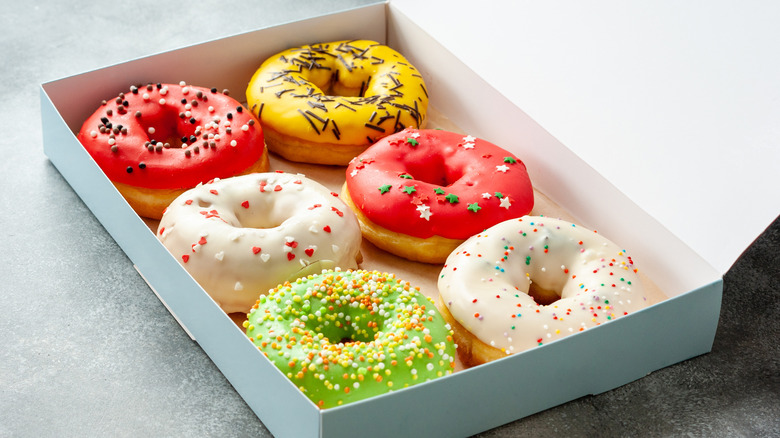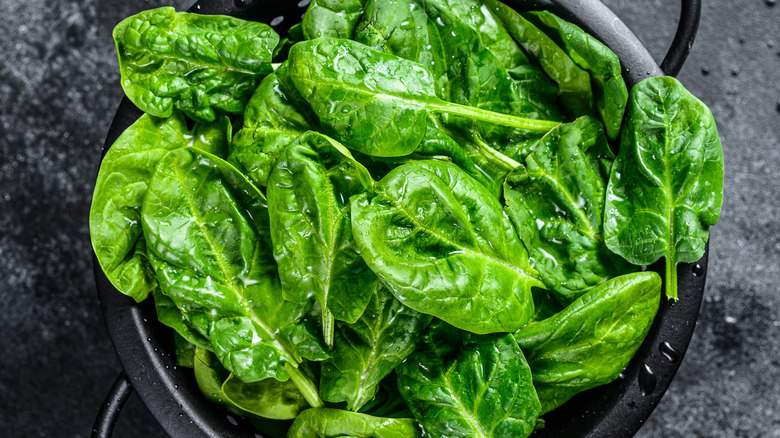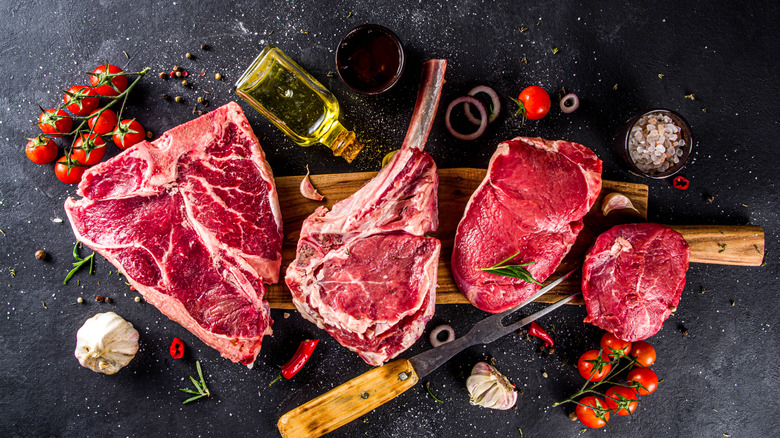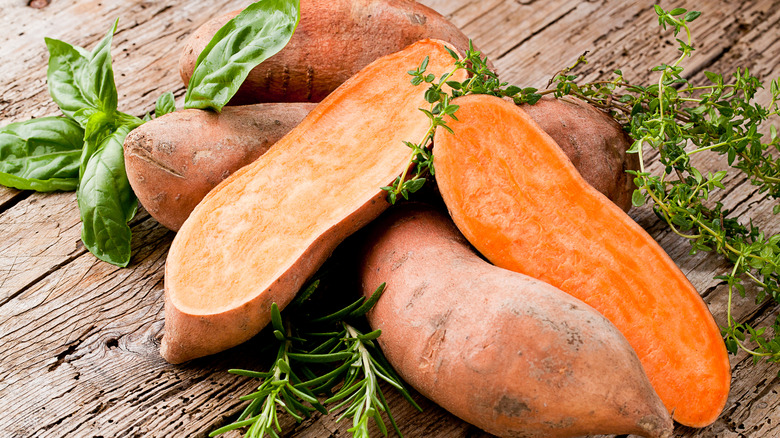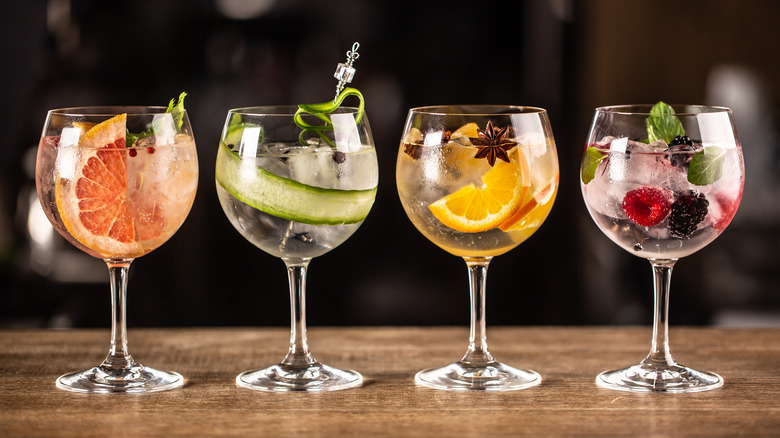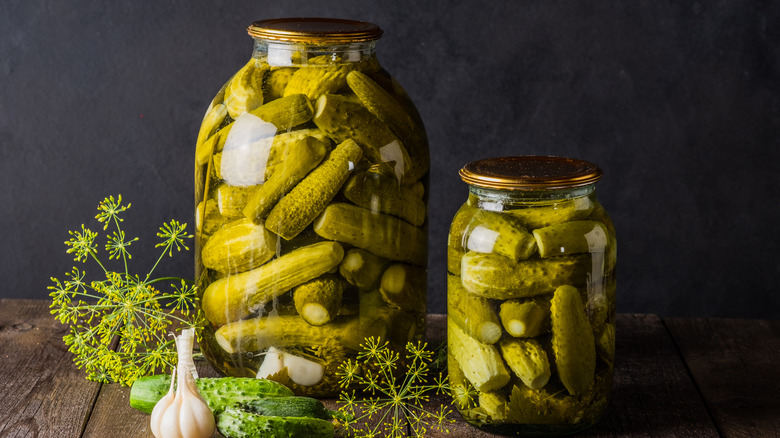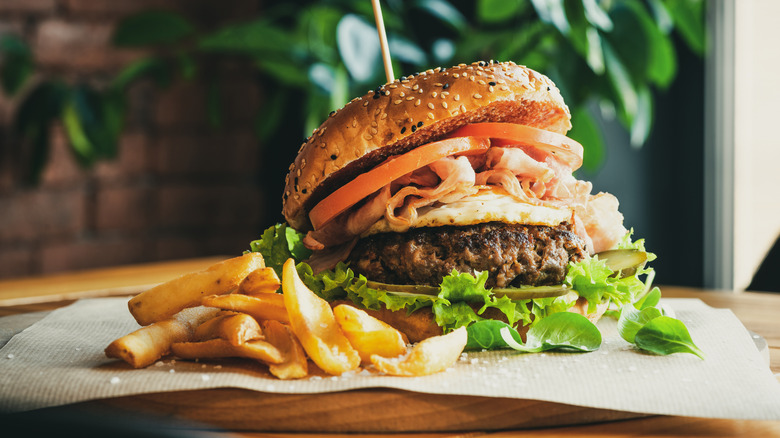The Best And Worst Foods For Your Vaginal Health
Here's an interesting question. When's the last time you gave your vagina a self-exam? Although it's definitely important to schedule an appointment with your physician to have a pelvic exam every one to three years (the time frame depends on the state of your vaginal health or any concerns you may have), a self-exam can help you check for any potential abnormalities between visits.
To better understand what a healthy vagina looks and feels like, we should first go over some characteristics of an unhealthy one. According to WebMD, warning signs include bumps, sores, warts, or discharge that is smelly or a color other than white, off-white, or clear (via Medical News Today). By performing a simple self-examination at home, as WebMD explains, you can check for these warning signs.
In addition to the vaginal self-exam, there are other ways to be proactive regarding your vaginal health — one of them concerns your diet. So, let's take a moment to learn about foods that are beneficial to vaginal health and others that, well, aren't so great for it. Having this knowledge is a surefire way to care for your vagina from the inside out.
Best: Garlic can ward off vaginal infections
Vaginas (the inner tube that connects from your vulva to the neck of your uterus, or your cervix), per Mayo Clinic, are amazing. They are also somewhat fragile when it comes to how prone they can be to infections. According to Healthline, some ways to keep infections, such as yeast infections, bacterial vaginosis (BV), and atrophic vaginitis, at bay is to keep the pH levels of your vagina in balance. You can do this by bathing in plain water, not wearing super tight clothing, not douching, and avoiding feminine products that are scented.
If you do happen to get a yeast infection (which can happen when there is an overgrowth of yeast in your vaginal region), garlic, one of the best spices for your health, can help speed up the healing process. As Healthline noted, garlic helps to inhibit the growth of yeast. So, whether you choose to cook with fresh garlic, take a capsule of garlic, or apply a topical cream, the allicin in garlic could bring great relief to any possible itching or irritation.
Worst: Soy contains phytoestrogens that can throw off your natural hormone levels
When it comes to foods that are considered to be healthy or unhealthy, soy is a bit controversial. One reason why is that soy is a phytoestrogen type of food. This means that it's plant-based and can produce estrogen-like effects. According to the Harvard School of Public Health, when it comes to women's health, on the one hand, soy could reduce hot flashes and help prevent hormone-based cancers, such as breast cancer, but, on the other, soy could also potentially throw off your estrogen levels.
So, while soy is a bit of a mixed bag, at the very least, take the "less is more" approach by not drinking a ton of soy milk or using soy sauce during every other meal. After all, it's better to be on the safer side of things. Right?
Best: Cranberries help fight and prevent UTIs
If you've ever been curious about what causes a urinary tract infection (UTI), we've got some answers. It's basically what occurs when bacteria enters into your urinary tract. According to the Mayo Clinic, some signs of a UTI include a constant urge to urinate, burning when urinating, urine that appears cloudy, urine with a strong odor, and urine that may be slightly pinkish in color. If you sense you have a UTI, although it really is best to make an appointment with your doctor to confirm, there are tests you can take at home (per WebMD).
As far as preventative measures go, Mayo Clinic lists consuming lots of water, urinating after sex, wiping from front to back, and drinking pure cranberry juice (not the cocktail stuff like Ocean Spray) as a few. Cranberries are good because they are highly acidic, and they pose a challenge for bacteria to stick to your uterine walls. Oh, and if you don't like the taste of cranberries when in their purest form, there are cranberry pills you can take. They can be found at your local health food store.
Worst: Asparagus can make your vagina smell
WebMD says that your vagina is in a pretty healthy state when its pH level is somewhere around 4.5. However, because the vagina contains discharge, yeast, and bacteria, it's not uncommon for it to have a slight scent. When you have an infection, though, that smell can shift into something that is fishy, bloody (like if you leave your tampon in too long), or so pungent that other people can smell it.
Something else that can cause your vagina to have a foul odor are certain foods. Some that top the list include onions, garlic, and asparagus. That's because they are all made of sulfur (per Healthline), and, if you've ever smelled pure sulfur before, you know it's not the best scent in the world. As far as asparagus tips dipped in butter go, no one is saying you can't ever have them again. But, it should go on record that, on the days you're planning for an intimate evening, you might want to eat something else instead.
Best: Greek yogurt can make your vaginal fluids smell better
Speaking of ways to make your vagina smell more pleasant, you can never go wrong with being intentional about using probiotics. Since your health is largely controlled by your gut, the healthy bacteria and yeast (like lactobacillus and Bifidobacterium) that probiotics contain can help ward off bad bacteria, facilitate digestion, and make it easier for your system to absorb medications. Also, according to Healthline, a certain strain of probiotic, known as L. acidophilus, can help prevent an imbalance in your vagina's pH — and, when your pH is right, your vagina smells healthy.
One food that is high in probiotics (including L. acidophilus) is Greek yogurt (per Time). So, if you're wondering what you can eat as you're running out the door in the morning or what is a smart snack to eat throughout the day, Greek yogurt will do your body a lot of good — your vagina included.
Worst: Coffee can throw off your vagina's pH balance
If you're curious what "the number system" of the vagina is all about, Healthline breaks it all down for you. At the end of the day, pH balance concerns how acidic or alkaline some part of your system is. A normal vagina should have a pH of somewhere between 3.8 and 4.5; anything over is too acidic, and anything under is too alkaline. A number higher than 4.5 makes you susceptible to things like bacterial vaginosis, among other infections.
One food that can make your vagina more acidic than it needs to be is coffee: It has an acidic average of somewhere between 4.85 and 5.10. No one is saying not to drink coffee anymore. But, at the same time, if you're consuming more than four cups a day (per Mayo Clinic), you should probably scale back a bit — not just for the sake of your vaginal health but your health overall.
Best: Lentils can improve ovulation
This is really interesting. According to the U.S. Department of Health and Human Services' Office on Women's Health, approximately 10% of women, between the ages of 15 and 44, experience complications trying to conceive. While many factors can directly attribute to infertility issues, some studies state that protein-deficiency can play a direct role in infertility (especially ovulatory infertility) — not only that, but eating plant-based protein has a better chance of improving this health issue than that of meat-based protein.
One food that is high in plant-based protein (12 grams per ½ cup serving, in fact) is lentils. Since they also are high in fiber, potassium, folate, iron, and manganese, how could you possibly go wrong with treating yourself to some yummy homemade lentil soup, lentil curry, or even lentil tacos? They are filling, healthy, and can strengthen your reproductive system on a myriad of levels.
Worst: Sugar feeds yeast and can lead to a yeast infection
As previously discussed, yeast in the vagina is normal; it's when there is an overproduction of it that things start to get uncomfortable. That said, something that yeast enjoy eating, just about as much as we do, is sugar (and starches, per Scientific American and Medical News Today). In fact, this is why some women can get a yeast infection, use an over-the-counter cream, or take an antibiotic to treat it and then get another one a few weeks later. Health explains that your diet can play a direct role in whether the body fully heals from a yeast infection.
Since consuming too much sugar can also lead to obesity, diabetes, high blood pressure, inflammation, and a host of other health-related issues, if you know that you eat more sugar than you should, use your vaginal health as a motivator to consume less of it — as soon as possible.
Best: Dark leafy greens can increase vaginal lubrication
If any food is basically like a multivitamin, it would have to be dark leafy greens. They are loaded with vitamins A, B, C, E, and K, as well as magnesium, potassium, iron, and calcium. As a bonus, they're low in cholesterol and sodium, too. According to Medical News Today, dark leafy greens help fight off free radicals, boost immunity, protect the body from oxidative stress, contain anti-inflammatory properties and antioxidants, and help strengthen your bones as well as your heart.
When it comes to your vaginal health, Insider reveals a perk to consuming these types of veggies: They can also help prevent vaginal dryness. That's because many dark leafy greens are high in beta carotene, which helps your system make Vitamin A, a nutrient that fends off vaginal dryness. Vitamin E, which leafy greens are full of, also promotes vaginal lubrication.
Worst: Fatty meat can cause vaginal inflammation
Did you know that meats high in saturated fat can trigger inflammation in the body? This is important to keep in mind as it directly relates to vaginal health because plenty of data support the idea that consuming fatty meats can lead to vaginal infections, such as bacterial vaginosis. Additionally, many meats contain hormones called xenoestrogens. These are considered to be endocrine disruptors that can cause all kinds of health-related issues — including vaginal cancer — if you're not careful.
For this reason and the sake of your overall diet, it really is best to eat leaner cuts of meat. Medical News Today states that, by doing so, you will also lower your cholesterol levels and your risk of heart disease, while even increasing your longevity. As for the best kinds of lean meats, look for packaging that says the meat was grass-fed and is 90% lean.
Best: Sweet potatoes help strengthen your vaginal walls
If you're a big fan of sweet potatoes, you're most definitely doing your body a lot of good. Not only are they packed with protein, fiber, vitamin A, vitamin C, manganese, and potassium, but Health shares that some of the direct health benefits of sweet potatoes are their anti-inflammatory properties that can help control blood sugar levels and regulate blood pressure. And, even though they are sweet, they can actually help you lose weight.
The reason why sweet potatoes make the "good for your vagina" list is, as Healthline reveals, that, when consumed on a consistent basis, the beta carotene and Vitamin A in sweet potatoes can help strengthen your uterine walls. This is really good to know if you've been struggling to conceive, because having strong uterine walls can significantly decrease your chances of experiencing a miscarriage, while also increasing the possibility of having a live birth.
Worst: Alcohol can dehydrate your vagina
The effect that alcohol has on women when it comes to sex is a bit of a mixed bag. While, on one hand, it can increase your desire levels and cause you to become aroused, on the other hand, it can also sometimes produce a negative psychological effect. Medical News Today notes that it can even numb your genitalia or decrease the amount of lubrication that your vagina produces.
Alcohol causing a lack of lubrication is actually not all that shocking considering that alcohol is known to dehydrate the body. WebMD shares that, for every alcoholic drink you consume, you can lose up to four times as much liquid (that's a lot!). So, even if you plan on having a few drinks to help you "get in the mood," at the very least, pair each alcoholic drink with a glass of water. That way, you won't have to worry so much about vaginal dryness becoming an issue.
Best: Fermented foods help keep bacteria at bay
If you ever wondered what causes a food to make the "fermented" list, it's when carbs have been converted over to alcohol or organic acids. Some foods that make the fermented foods list include (dill) pickles, yogurt, kefir, sauerkraut, sourdough bread, miso, and kombucha. Fermented foods are good for you because they contain powerful antioxidant, antimicrobial, antifungal, anti-inflammatory, and anti-diabetic properties that can help keep your gut healthy (and, since the majority of your immunity is located in the gut, that's a really good thing!).
Your vagina enjoys fermented foods because, according to Science Based Medicine, they are considered to be probiotics, too. As already discussed, probiotics can help keep yeast and bacteria in balance, so that you significantly decrease your chances of getting a vaginal infection. So, if enjoying a couple of dill pickles or putting some sauerkraut on your sandwich is something you really enjoy doing — eat up! These kinds of foods are not only good to your taste buds, but they're also great for your vaginal health.
Worst: Junk food can trigger a bacterial vaginosis outbreak
No matter how much you might enjoy a drive-thru combo, a slice of pizza, processed meats, desserts, or sugary drinks (like soda), there's no way around the fact that they are all classified as a form of junk food, and, scientifically, junk food is considered to be low in micronutrients. This is problematic because micronutrients are the vitamins and minerals your body needs to remain healthy and strong.
When it comes to maintaining vaginal health, specifically, because a lot of junk food is high in sugar (per WebMD), it can potentially trigger a yeast infection. Plus, studies support the fact that high quality diets can actually reduce your chances of being diagnosed with bacterial vaginosis.
Bottom line: While it may be super difficult to go your entire life without a favorite type of junk food, do try and eat it as little as possible. To stay in great shape, your body needs all the micronutrients it can get — your vagina included.
